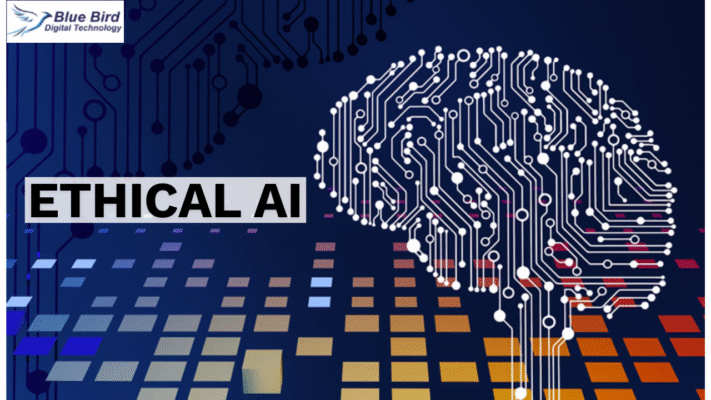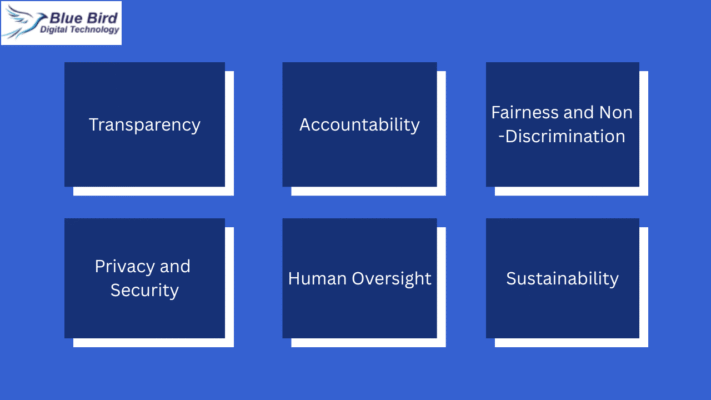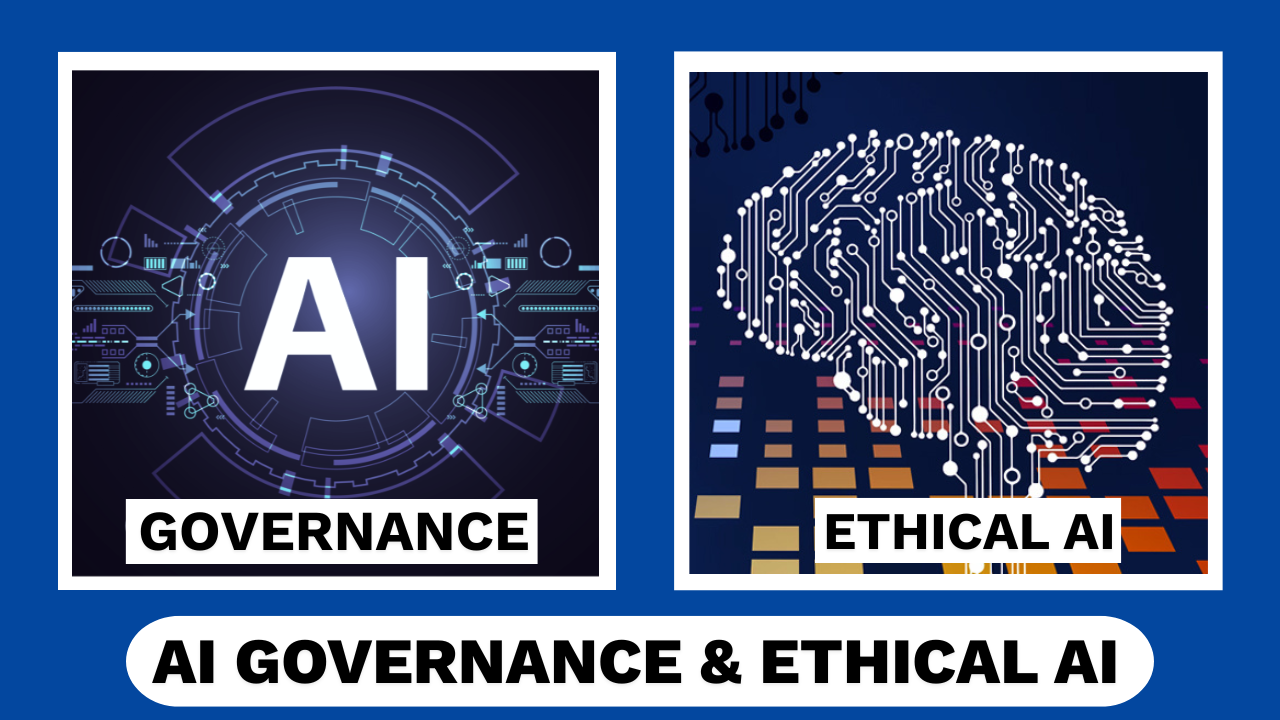AI Governance & Ethical AI together form the foundation for a balanced future—one where technology serves humanity without compromising fairness, transparency, or accountability. As countries like India, the United States, and those in the European Union move toward Artificial Intelligence regulation.
Introduction
Artificial Intelligence (AI) has evolved from being a futuristic concept to a real-world necessity driving industries, economies, and innovation. From predictive healthcare systems to autonomous vehicles, AI shapes decisions and influences human lives more than ever before. However, as its influence expands, so do the ethical and governance challenges surrounding it. Therefore, the world today is not just asking how powerful AI can be, but also how responsible it should be.
Understanding AI Governance
AI Governance refers to the set of principles, policies, and frameworks that guide the responsible development and use of AI systems. It ensures that AI aligns with human values, legal norms, and societal goals. Unlike traditional governance models, What is AI governance must address constantly evolving challenges such as data privacy, algorithmic bias, and decision accountability.

In simple terms, AI in Governance acts as a “moral compass” for technology. It doesn’t stop innovation but instead ensures that innovation remains trustworthy. Every organization using AI—from healthcare startups to banking giants—needs clear ai governance framework policies that define how data is collected, used, and stored, and how automated decisions impact people’s lives.
Why Ethical AI Matters
Ethical AI is the backbone of governance. It represents a commitment to fairness, inclusivity, and transparency in how AI operates. When AI systems make decisions—such as approving loans, diagnosing diseases, or recommending jobs—they directly impact human lives. Therefore, if these systems carry hidden biases or operate opaquely, they can unintentionally harm individuals or groups.

For example, facial recognition systems have faced criticism for misidentifying people with darker skin tones due to biased training data. Similarly, predictive policing tools sometimes reinforce social inequalities. Hence, ethical AI ensures that technology augments human decision-making rather than discriminating against it.
Furthermore, ethical AI enhances trust. When consumers trust AI-driven systems, adoption becomes smoother, and innovation thrives responsibly. Without ethical grounding, even the most advanced AI tools can lead to public backlash, regulatory fines, or brand damage.
Key Pillars of AI Governance

To make AI responsible and ethical, governance frameworks often revolve around a few essential pillars. These pillars serve as guidelines for organizations adopting AI technologies responsibly.
Transparency
Transparency ensures that AI systems are understandable. Users and regulators should know how AI arrives at decisions. This involves explainable algorithms, open datasets where possible, and clear communication regarding model limitations.
Accountability
Accountability defines who is responsible when AI makes a wrong decision. Whether it’s a developer, company, or government body, someone must be accountable for outcomes. Proper documentation and review mechanisms strengthen accountability.
Fairness and Non-Discrimination
AI systems must treat everyone equally. Therefore, datasets must be diverse and unbiased. Developers should test models across demographic groups to ensure fairness.
Privacy and Security
AI depends heavily on data, making privacy protection a top priority. Data should be anonymized, stored securely, and used only for authorized purposes. In addition, cybersecurity measures must prevent misuse or data breaches.
Human Oversight
AI should assist humans, not replace them. Critical decisions—such as hiring, healthcare, or law enforcement—must include human review to prevent unethical or unintended consequences.
Sustainability
Ethical AI also considers environmental and social impact. Energy-efficient computing, responsible hardware disposal, and sustainable innovation contribute to long-term ethical responsibility.
Global Efforts and Frameworks
Countries and organizations worldwide are recognizing the urgent need for AI governance. Consequently, global initiatives are setting benchmarks to ensure responsible AI growth.
-
European Union (EU): The EU’s Artificial Intelligence Act (AI Act) is one of the world’s most comprehensive frameworks. It classifies AI systems based on risk levels and imposes stricter obligations on high-risk systems such as healthcare and law enforcement tools.
-
United States: The U.S. follows a more sector-based approach, encouraging voluntary frameworks like the NIST AI Risk Management Framework, which guides industries in adopting safe and ethical AI.
-
OECD (Organization for Economic Cooperation and Development): OECD’s AI Principles emphasize human-centered values, transparency, and accountability. These principles have influenced global AI policies.
-
United Nations: The UN stresses global cooperation in ensuring AI supports peace, human rights, and sustainable development goals (SDGs).
Each of these frameworks has one goal—to make AI beneficial, inclusive, and trustworthy.
India’s Approach to AI Governance
India is emerging as a major hub for AI innovation. From agriculture and healthcare to fintech, AI is driving massive transformations. However, India also faces unique governance challenges due to its vast diversity and scale.
- NITI Aayog’s “Responsible AI for All”: NITI Aayog’s initiative focuses on inclusive and transparent AI deployment. It emphasizes fairness, explainability, and accountability. The framework encourages AI use in sectors like education, agriculture, and healthcare while ensuring social welfare.
- Data Protection and Privacy: India’s Digital Personal Data Protection Act (DPDP), 2023 strengthens individual data rights and restricts unauthorized use. This Act complements AI governance by enforcing strict data handling norms.
- AI Research and Innovation: India’s AI Mission promotes research in explainable AI, ethical model development, and open innovation. Collaboration between public and private sectors ensures responsible progress.
- Challenges in Implementation: Despite progress, enforcement remains complex. Many startups lack the resources to maintain governance standards. Moreover, awareness about AI ethics among developers and policymakers is still growing. Bridging this gap through training, policy support, and global cooperation is essential.
Challenges in Implementing AI Governance
While AI governance frameworks sound promising, implementing them poses practical challenges.
-
Lack of Standardization:
Different countries and organizations interpret AI ethics differently. This variation leads to inconsistent practices across industries. -
Rapid Technological Evolution:
AI evolves faster than laws. As a result, policies often lag behind innovations, leaving gray areas for misuse. -
Complexity of AI Systems:
Deep learning models are often “black boxes,” making it difficult to explain their decisions. Hence, transparency becomes harder to achieve. -
Data Bias and Quality:
AI models depend on data, and biased data leads to biased outcomes. Maintaining balanced datasets across populations remains challenging. -
Economic Pressure:
Many organizations prioritize profits and speed over ethics. Without strong governance incentives, ethical practices may take a backseat.
Addressing these challenges requires global collaboration, continuous education, and robust technological tools that enable explainability and compliance.
Benefits of Strong AI Governance
Despite its challenges, strong AI governance offers numerous advantages.
-
Enhanced Trust: Transparent AI builds user confidence and strengthens brand credibility.
-
Regulatory Compliance: Proper governance helps organizations avoid legal issues and penalties.
-
Innovation Acceleration: Ethical frameworks create a stable environment for innovation without fear of misuse.
-
Better Decision-Making: Bias-free, accountable AI ensures decisions are fairer and more reliable.
-
Global Competitiveness: Nations and companies that prioritize ethical AI gain global trust and economic advantage.
Therefore, AI governance is not just a moral responsibility—it’s a strategic business asset.
The Future of Ethical AI
Looking ahead, the future of AI governance lies in automation, collaboration, and adaptability. AI systems themselves will likely assist in governance through self-monitoring, auditing, and risk prediction mechanisms. Moreover, ethical design will become part of every AI lifecycle stage—from development to deployment.
AI literacy will also play a crucial role. As users understand how AI works, they can demand more transparency and fairness. Governments, educational institutions, and tech companies must therefore collaborate to promote ethical awareness.

